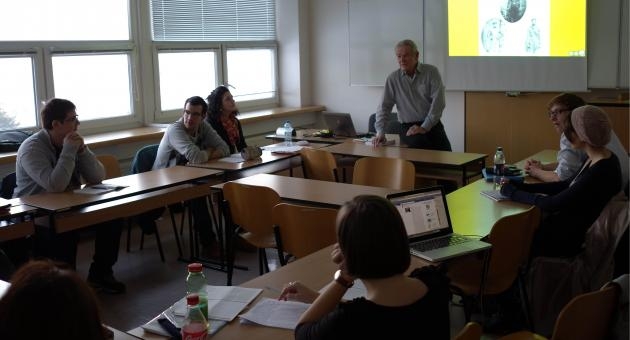History professor brings American-style dissent to Prague

What could Temple History Professor Ralph Young teach students about dissent in Prague, Czech Republic, home of the Prague Spring that was brutally crushed in 1968 and the Velvet Revolution of 1989?
As it turns out, quite a lot.
In teaching a two-week version of his popular Temple course “Dissent in America” at Charles University in Prague over the winter break, Young hoped that the Czech students would come away with a deeper understanding of Americans and our history. But he actually expected to learn more from them about the concept, while deepening his understanding of its international influences. In the end, he experienced all that and more.
Although a tradition of dissent dates back to America’s founding, Young found that the Czech students were surprised at how deep and long it has been part of this nation.
“The earlier stuff was eye-opening for them,” he said. “I emphasized that it’s fundamentally part of the American tradition.”
The Czech Republic was one of the more open countries behind the Iron Curtain during the Cold War, he said, but citizens there had to express dissent in a “much more undercover and subtle way than the American way. At certain times in their history, it was much more dangerous to protest than it was here.”
During the two-week seminar, Young focused primarily on the 1960s and present-day protests, such as Occupy Wall Street. The class explored how American dissent influenced European dissent in 1968 and how the Arab Spring influenced America in 2011. What both teacher and students came to understand better is that in this global age, protests do not happen in a vacuum — nations are constantly influencing one another.
“The experience broadened my already broad perspective,” said Young. “I lived in Europe for ten years, and this recent trip solidified my own thinking that there really are these very deep connections with other countries — especially in countries like the Czech Republic that have had so much oppression.”
Young said that the students also enjoyed the American-style classroom atmosphere.
“In Europe most professors just lecture. I’m constantly trying to get a discussion going and to get the students talking. At times this was hard, but they eventually opened up,” said Young.
He even used his guitar to demonstrate American protest music, as he does in his Temple class. “It was refreshing for them, this kind of laid back atmosphere.”
It appears that Young definitely left his mark. To paraphrase one of Young’s Czech students, Adam Podhola, “It was a great decision to bring Mr. Young to us. My classmates and I agree on this. His lectures were really engaging, and they will certainly stay in my mind. It’s been a long time since I looked forward to going to class so much.”